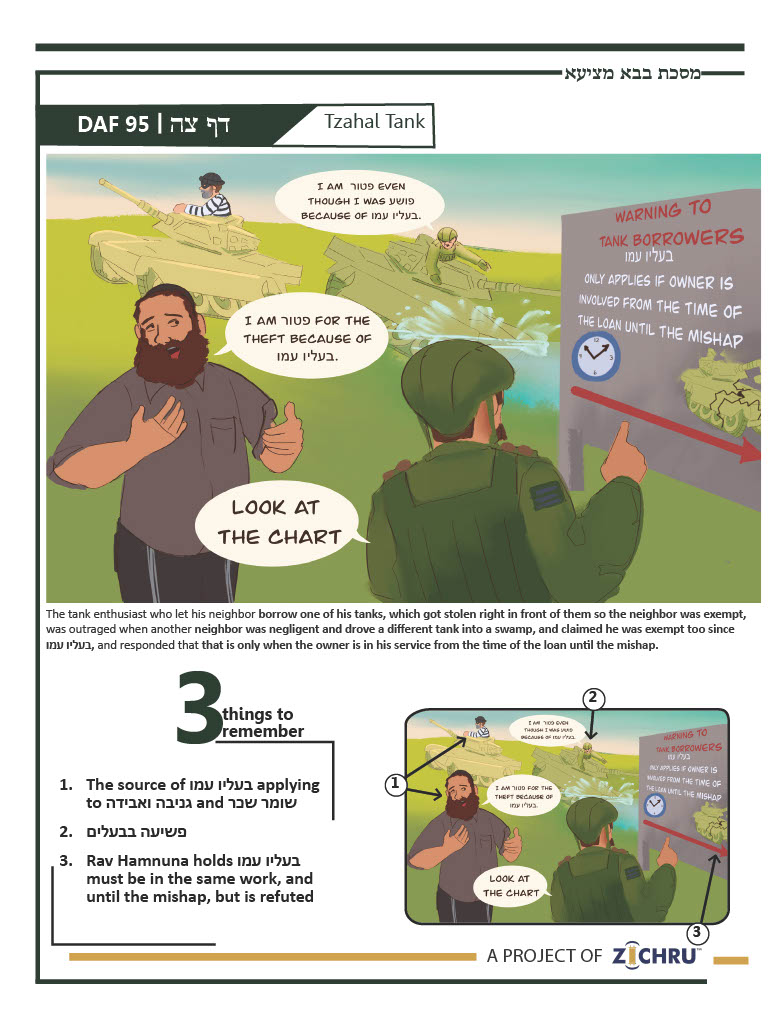Bava Metzia - Daf 95
- Audio Timestamps
0:00 - The 3 Sugyos
3:15 - Review of 3 Sugyos
6:16 - Siman
8:53 - 4 Blatt Back Chazarah
16:49 - Pop Quiz (Last 7 blatt)
For access to all Zichru resources including PDFs, and illustrations CLICK HERE
- The source of בעליו עמו applying to גניבה ואבידה and שומר שכר
After deriving the liabilities for the various types of שומרים, the Gemara then seeks the source that the exemption of בעליו עמו, which is written by שואל regarding a mishap of שבורה ומתה, applies to גניבה ואבידה as well. It cannot be derived from the other mishaps, which are אונסין. The Gemara suggests deriving it from שומר שכר, whose exemption of בעליו עמו applies to its liabilities (i.e., גניבה ואבידה), but then asks for the source to apply the בעליו עמו exemption to שומר שכר itself. The Gemara explains that the section about שואל begins with the words "וכי ישאל" – and if he shall borrow; וי"ו מוסיף על ענין ראשון – the word “and” indicates this section adds to the first topic (i.e., the previous section discussing שומר שכר), וילמד עליון מתחתון – and laws of the former should be derived from the latter. Thus, just as שואל is exempt with בעליו עמו, a שומר שכר is exempt from his liability with בעליו עמו. The Gemara eventually says that the "וי"ו מוסיף" also indicates to derive the latter section (שואל) from the former (שומר שכר), teaching that שואל is also exempt from גניבה ואבידה with בעליו עמו.
- פשיעה בבעלים
Rav Acha and Ravina debate the law of פשיעה בבעלים – negligence of a שומר where the owner was in his service. One holds him liable for negligence, although he is exempt for other mishaps, and the Gemara explains that he holds: מקרא נדרש לפניו – the passuk (exempting בעליו עמו) is darshened (through the "וי"ו מוסיף") to be extended to the section just before it (i.e., שומר שכר), ולא לפני פניו – but not for the section before the section before it (i.e., the first section, discussing שומר חנם). Since שומר חנם does not enjoy the בעליו עמו exemption, and other שומרים’s liability for negligence is derived from שומר חנם, all שומרים are liable for negligence even in a case of בעליו עמו, because the exemption only applies to liabilities written explicitly in those sections. The other opinion, that a שומר is exempt even from negligence in a case of בעליו עמו, holds the passuk is darshened even two sections earlier, extending the בעליו עמו exemption to שומר חנם (and any negligence).
- Rav Hamnuna holds בעליו עמו must be in the same work, and until the mishap, but is refuted
Rav Hamnuna said: לעולם הוא חייב – [the borrower] is always liable, עד שתהא פרה וחורש בה – unless the borrowed cow is being used for plowing and [the owner] plows with it for the borrower, חמור ומחמר אחריה – or the borrowed donkey is being used to carry goods, and [the owner] drives the donkey by walking behind it, ועד שיהו בעלים משעת שאילה עד שעת שבורה ומתה – and also unless the owner is in his service from the time of the loan until the time the animal’s limb was broken or it died. He holds "בעליו עמו" refers to the entire loan, thus requiring that the owner services the borrower in the very same labor as the loan and must be in his service for the entire period of the loan, until the mishap occurred.
He is challenged from a Baraisa teaching that a borrower is exempt from paying, even where the owner is performing work for him "במקום אחר" – in a different location, which it eventually proves to mean different labor. Two Baraisos are then brought which explicitly state that the owner must only be in his service at the time of the loan, and not when the mishap occurred. Thus, both of Rav Hamnuna’s laws are refuted.
Siman – Tzahal Tank
The tank enthusiast who let his neighbor borrow one of his tanks, which got stolen right in front of them so the neighbor was exempt, was outraged when another neighbor was negligent and drove a different tank into a swamp, and claimed he was exempt too since בעליו עמו, and responded that that is only when the owner is in his service from the time of the loan until the mishap.


